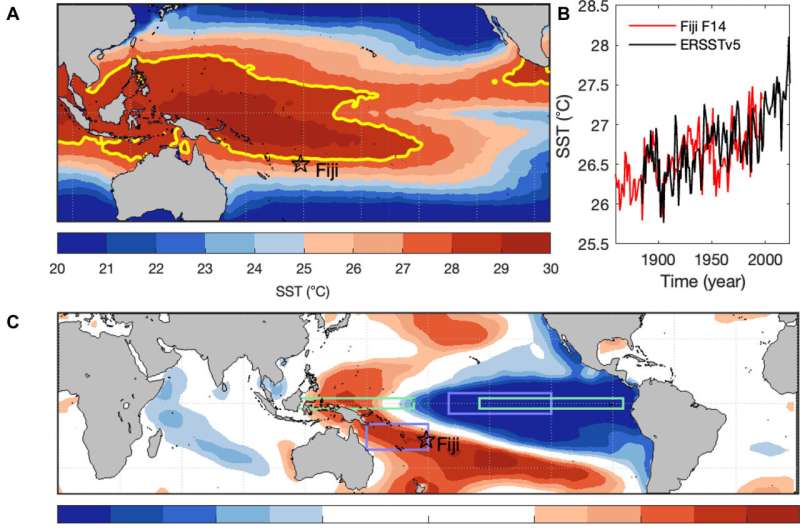This article has been reviewed according to Science X's editorial process and policies. Editors have highlighted the following attributes while ensuring the content's credibility:
fact-checked
peer-reviewed publication
trusted source
proofread
Fijian coral reveals new 627-year record of Pacific Ocean climate

An international team of climate scientists have used a 627-year coral record from Fiji to reveal unprecedented insights into ocean temperatures and climate variability across the Pacific Ocean since 1370.
The study published in Science Advances, co-authored by Dr. Ariaan Purich from Monash University and Professor Matthew England and Dr. Rishav Goyal from UNSW, shows how human-caused climate change is interacting with long-term patterns of climate variability in the Pacific.
The new coral record shows that the local ocean temperature was warm between 1380 and 1553, comparable to the late 20th and early 21st centuries. However, when combined with other coral records, the Pacific-wide warming observed since 1920, largely attributed to human-derived emissions, marks a significant departure from the natural variability recorded in earlier centuries.
The record also shows that present ocean temperature is the highest for the past 653 years.
The work provides new insights to understand how climate trends are leading to shifts in weather patterns and more extreme weather events that will have significant implications for millions of people living in the Indo-Pacific region.
Ocean temperatures influence coral growth, and thus corals preserve records of past environmental conditions over centuries. This remarkable 627-year coral record (1370–1997) provides the longest continuous sea surface temperature reconstruction to date.
The study comes one week after scientists revealed in Nature a 400-year coral record showing how the Great Barrier Reef faces catastrophic damage from the record-high ocean temperatures.
The team used the Fijian coral record to reconstruct the Interdecadal Pacific Oscillation, a large-scale phenomenon that influences climate variability across the Pacific Ocean, nearly doubling the length of previous reconstructions. This long reconstruction allowed the interplay of climate variability and change to be examined, revealing atypical basin-wide warming over the past century.
Dr. Ariaan Purich said that understanding the long-term climate variability in the Pacific is crucial for predicting future climate change.
"This new, long reconstruction helps us untangle the climate change signal from natural variations in the Pacific. Understanding the past helps us to project future climate change; our new reconstruction shows us that current Pacific-wide warming is a feature of the climate-change era."
The study was led by Dr. Juan Pablo D'Olivo from the National Autonomous University of Mexico and Professor Jens Zinke from the University of Leicester, in collaboration with an international team of earth and climate scientists from Mexico, United Kingdom, France, Germany and Australia.
The new record is based on a geochemical analysis of the Sr/Ca ratio in coral—a proxy for past ocean temperature—that was collected from a colony of a giant boulder coral called Diploastrea heliopora in the Fijian Archipelago.
Dr. Ariaan Purich said the findings have a range of implications for future climate.
"Temperature variations across the Pacific influence weather systems—broad-scale warming can lead to a drying climate across the Coral Sea region. This will impact the people and ecosystems across the vulnerable Pacific Island nations."
The study provides further motivation for the global community to keep working towards limiting warming to 1.5ºC by developing renewable energy resources at scale, to electrify the economy and phase out coal and gas.
More information: Juan P. D'Olivo et al, Coral Sr/Ca-SST reconstruction from Fiji extending to ~1370 CE reveals insights into the Interdecadal Pacific Oscillation, Science Advances (2024). DOI: 10.1126/sciadv.ado5107
Journal information: Science Advances , Nature
Provided by Monash University


















